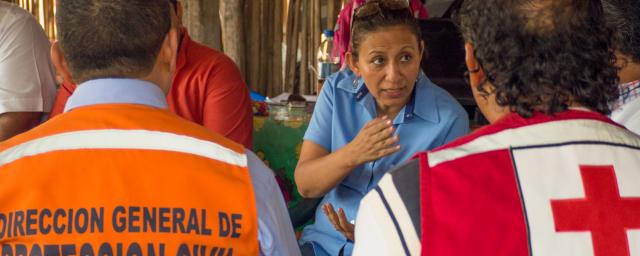
Karen Ramirez (center) meets with members of a national emergency coordination body in a community affected by a storm surge in 2015. Photo: Elizabeth Stevens/Oxfam
“Organizations with local roots have so much important knowledge and such valuable networks that they should be taking the lead in emergencies, not following orders.”
Across the globe, climate change and prolonged armed conflicts are triggering crisis after crisis with no end in sight, pushing international aid agencies to their limits. By the end of 2019, disasters had displaced nearly 80 million people, and in 2020, a staggering 168 million will need assistance and protection in the face of crises.
Now we face a choice: fall far short in our mission to save lives and prevent suffering in emergencies, or find a better way forward to meet these growing needs.
Oxfam is calling for fundamental change in the international humanitarian system to ensure that power and resources are shifted to local and national organizations that are well placed not only to participate in emergency responses but to lead them.
The first to arrive, the last to leave
Local and national organizations can be the first and best responders when disasters strike. They can reach disaster zones swiftly, and with their understanding of the local languages, cultures, geography, and political realities, they can readily grasp the needs in the communities and formulate solutions tailored to each context.
Because they are helping their own communities, they are often the most dedicated humanitarian responders of all - the first to arrive on the scene and the last to leave. Which means they can save lives at the outset and also sustain recovery and risk-reduction efforts long after international responders have departed.
Duke Ivn Amin, emergency response team leader for JAGO NARI, displays hand sanitizer made and distributed by the organization. Photo: JAGO NARI
When the COVID crisis struck in Bangladesh, Oxfam partner organization JAGO NARI shifted into high gear. For weeks, team members lived out of their office in Barguna so they could assist their communities without putting their own families at risk. JAGO NARI has since reached more than 20,000 families with aid—hygiene kits, cash, and health information—and is also coordinating 50 youth groups that are working on the response.
Overlooked, overshadowed, underfunded
Yet, the global humanitarian community has not fully recognized the ability of local and national NGOs, civil-society organizations, and government agencies to lead and implement effective humanitarian programming.
Inequities in the humanitarian system strongly favor international responders. The UN and major international aid agencies receive the lion’s share of international funding for disaster responses, and with it an inordinate amount of decision-making power during emergencies.
Currently, less than three per cent of international humanitarian assistance goes directly to local and national responders, including governments. Lacking adequate resources, they struggle to reach their potential.
Our vision: local people in the lead
International actors like Oxfam play a crucial role in times of crisis, rushing aid to the scene of a disaster when a country’s government is unable or unwilling to do so. But to ensure sustainable gains, international aid providers have another critical role: strengthen the capacity that is there.
Unless there is a compelling reason for international responders to temporarily take the lead, local and national (rather than international) leadership should be assumed from the outset of an emergency, with international agencies taking a supporting role.
Oxfam’s Local Humanitarian Leadership initiative promotes effective and accountable local and national leadership at the front lines of emergencies.
We are helping build a movement to shift power, knowledge, and resources from international actors to local humanitarian leaders around the world to create a more fair, effective, and sustainable system.
One facet of this work is sharing skills with local partners, from developing expertise in first response, risk reduction, and advocacy to strengthening financial systems and fundraising capacity--making sure the partners themselves guide the process.
Another is improving the system for funding local humanitarians. Donors and aid agencies must ensure that at least 25 percent of global humanitarian funding be shared as directly as possible with responsible governments and local organizations in vulnerable countries.
To ensure the safety and dignity of populations affected by disasters, women need to have a strong voice in decision-making. We have made upholding women’s rights and encouraging women’s leadership central to our local humanitarian leadership initiative.
People living in vulnerable countries and communities not only deserve to receive aid in emergencies but also to lead effective humanitarian programs themselves. By building on local capacity and creating space and support for local leadership, we aim to transform the global humanitarian system. To do so, we will need to challenge and transform ourselves—to redefine and deepen Oxfam partnerships, and learn to support local leaders more effectively.
